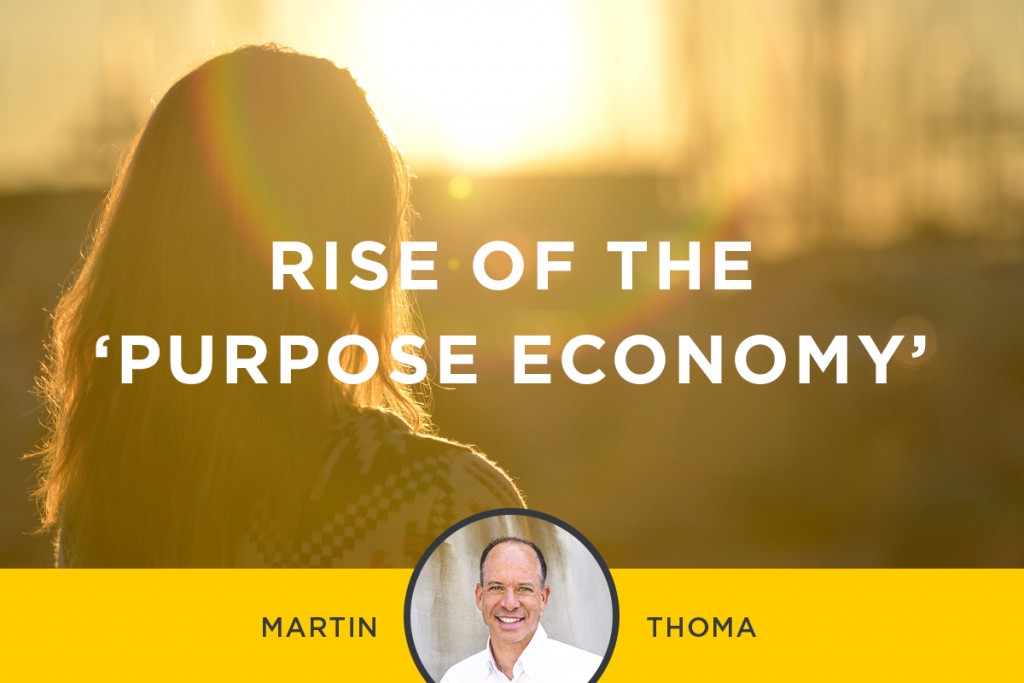Trend spotters note a new economy in the making: the “purpose economy.”
They argue that just as the industrial economy supplanted the agrarian economy and then was itself supplanted by the information economy, a new megatrend is producing entirely new ways of organizing businesses and producing value.
The purpose economy is driven by workers’ thirst for meaningful work; consumers’ affinity for socially responsible companies, products and services; and business efforts to satisfy these urges.
As a Global Trends briefing put it, “People want to make money but they also want to make a difference. New business structures are developing to address this underlying hunger for purpose-driven work … Examples include the rise of B corporations, hybrid nonprofit and for-profit organizations, philanthrocapitalism, social entrepreneurship, and crowd-driven philanthropy.” Websites, blogs, magazines and conferences explore these socially conscious ways of business.
Check out the 2015 Conference for Inclusive Capitalism convening next week in London.
The Obama White House set up a special office on social innovation. Niche talent firms now focus on “meaningful work.” (Commongood Careers, for example, sports the cheeky slogan “Will work for social change.”) Aaron Hurst, a self-styled global entrepreneur and foundation head, published a book detailing evidence of this global business sea change.
But is it new? Haven’t there been crusaders, reformers, humanitarians, nonprofits, NGOs, churches, social agencies, activists and other do-gooders for centuries? Sure. What’s new is the commercialization and acceleration of these ideas and activities. What’s new is the idea that business can, should or must drive social impact. What’s new is how mainstream — even de rigueur — purpose is becoming. When a giant capitalist like Morgan Stanley commits to steering $10 billion via its Investing with Impact Platform, you know that seeking purpose with profit has arrived.
[Tweet “”What’s new is the idea that business can, should or must drive social impact.””]
For the company leader interested in investing greater time, attention and resources into a purpose-driven business, Hurst says it’s important to understand three fundamental types of purpose and thereby how to address them:
Personal purpose is unique to every individual. It is “wired in” and it is generally discovered viscerally and emotionally by that individual. That said, an organization with a clearly articulated brand purpose can attract and engage individuals whose own North Stars align with the organization’s. Our client Southern Bancorp is a great example: By clearly articulating and amplifying inside the bank that its core purpose is to “invest, empower and transform” lives and communities, it can attract and retain not just great bankers, but “great bankers on a mission to build opportunity in rural America.”
Social purpose is derived in relationships. As social beings, humans derive meaning and sustenance from their relationships — with family members, with customers and with co-workers. For a business to generate social purpose, it must create and catalyze opportunity for meaningful relationships. In our business, we have found that our significant philanthropic commitment regularly places our team members together in celebrating common causes. They strengthen relationships by doing good work that “does good.”
Societal purpose is derived from the contribution that individuals and organizations make to the larger world. Societal purpose is derived from knowing our work matters. People generally want to contribute something to the world around them, and the opportunity to do it via their “day job” drives a sense of satisfaction and meaning. Thus, KPMG’s initiative is to connect its work and workers to the value they contribute to their clients and the world.
The purpose economy wave is powered by a rising social consciousness. Between 2008 and 2012, the number of consumers who believed it was OK for brands to support good causes and make money at the same time jumped nearly 20 percentage points. The same firm’s research shows that consumers are more and more willing to reward companies they see engaging in good causes.
Whether the “purpose economy” is indeed a fourth wave of global economic transformation or merely a clever mental construct, it is clear that a rising consciousness among customers, employees and other stakeholders demands that we as leaders and managers make meaning in our work and our organizations. What will you do “on purpose” to meet this opportunity?
This article originally appeared in Arkansas Business.
